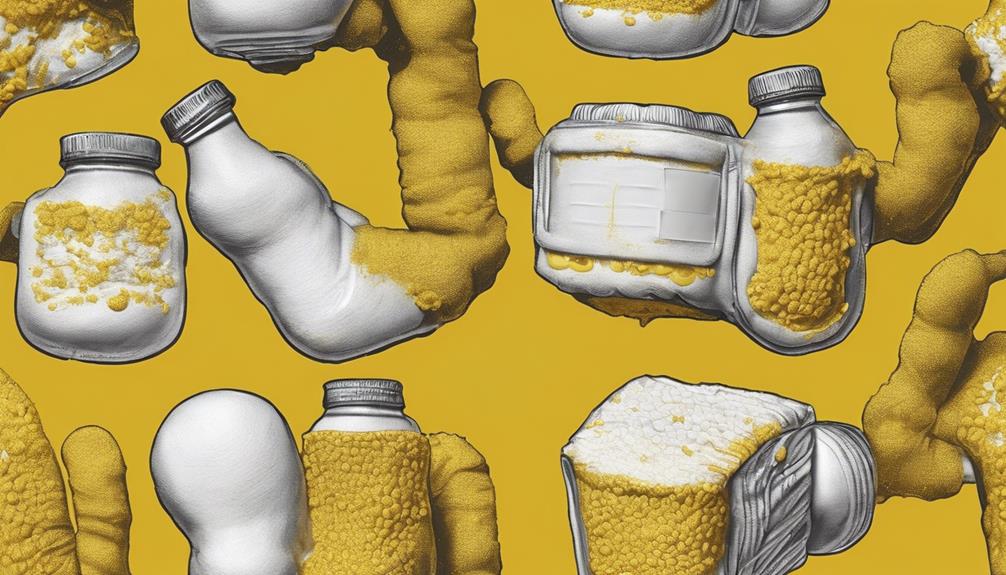As we navigate the murky waters of newborn runny poop, it becomes evident that understanding the underlying causes is akin to unraveling a complex puzzle.
However, once we grasp the pieces, finding suitable solutions to address this common issue can bring clarity and relief to both baby and caregiver.
Let's explore the intricacies of what could be causing these watery stools and how simple adjustments might hold the key to restoring balance for the little one.
Key Takeaways
- Breast milk composition influences stool consistency, impacting newborns' poop.
- Viral and bacterial infections can cause runny poop in newborns.
- Dietary adjustments, like eliminating allergens or introducing probiotics, can manage runny poop.
- Seek medical advice for persistent symptoms like diarrhea lasting over 24 hours or blood in stool.
Common Causes of Newborn Runny Poop
In our clinical observations, viral and bacterial infections, such as rotavirus and E. coli, emerge as predominant factors contributing to the occurrence of newborn runny poop. Diarrhea in babies can be a distressing experience for both the infant and caregivers. When considering the causes of baby diarrhea, it's essential to examine various factors such as the introduction of solid foods, breast milk composition, viral and bacterial infections, food allergies, and even the development of diaper rash.
Solid foods play a significant role in the digestive health of a baby. Introducing solid foods too early can overwhelm a newborn's digestive system, leading to loose stools. Breast milk, being the primary source of nutrition for infants, also influences stool consistency. Additionally, viruses and bacterial infections can cause inflammation in the gastrointestinal tract, resulting in diarrhea. In some cases, food allergies can trigger runny poop due to the body's adverse reaction to certain ingredients. Moreover, diaper rash, often accompanying diarrhea, can exacerbate the discomfort experienced by the baby. Understanding these various causes is essential in managing and treating newborn runny poop effectively.
Impact of Breastfeeding on Stool Consistency

Breast milk composition greatly influences the consistency of stool in newborns. Breastfed newborns often pass runny, mustard-colored stools due to the unique composition of breast milk. This is because breast milk contains natural laxatives that help regulate bowel movements and contribute to the loose consistency of newborn poop.
The high water content in breast milk plays an important role in maintaining hydration levels and softening stools in breastfed babies. Additionally, breastfeeding supports the growth of healthy gut bacteria, which aids in digestion and helps regulate stool consistency in newborns.
It's important to note that breastfed newborns may experience more frequent bowel movements with looser stools compared to formula-fed babies. Understanding how breastfeeding impacts stool consistency can provide valuable insights into the overall bowel health of newborns and support caregivers in interpreting their baby's digestive patterns.
Signs of Infection in Newborn Poop
Detecting signs of infection in a newborn's stool is important for early intervention and proper medical care. Blood or mucus present in newborn poop can be indicative of an infection. Additionally, foul-smelling or unusually colored poop may signal an underlying issue.
Changes in the frequency or consistency of newborn poop, especially if accompanied by persistent diarrhea, could suggest an infection. If you notice any of these abnormal signs in your newborn's poop, it's vital to consult a healthcare provider promptly for further evaluation and guidance.
Early detection and intervention in cases of infection can help prevent complications and guarantee the well-being of your newborn. Remember, your healthcare provider is there to support you and your baby's health, so don't hesitate to seek their expertise when needed.
Managing Runny Poop With Dietary Adjustments

To address potential causes of newborn runny poop, dietary adjustments play a significant role in managing stool consistency. When dealing with babies experiencing runny poop, it's essential to take into account their diet as a possible contributing factor.
Here are some dietary adjustments that can help manage runny poop effectively:
- Eliminate Potential Allergens: Removing common allergens like cow's milk from the baby's diet can alleviate runny poop. This step can be vital in identifying and mitigating dietary triggers.
- Breastfeeding Mother's Diet: Adjusting the mother's diet if she's breastfeeding can also impact the baby's stool consistency. Certain foods in the mother's diet may be causing the baby's runny poop, so modifications may be necessary.
- Introduce Probiotics or Prebiotics: Adding probiotics or prebiotics to the baby's diet can promote healthy gut flora, aiding in digestion and potentially improving stool consistency.
Making these dietary adjustments can often help manage runny poop in babies. However, if the issue persists, it's advisable to consult a healthcare provider for further medical information and guidance.
Seeking Medical Advice for Persistent Symptoms
When encountering persistent symptoms of newborn runny poop, immediate medical advice should be sought to address potential underlying issues effectively. It is important to recognize alarming signs such as diarrhea lasting more than 24 hours, the presence of blood or mucus in the stool, high fever, signs of dehydration like a sunken fontanelle, persistent vomiting, or lethargy in a newborn with runny poop. These symptoms necessitate prompt medical evaluation to guarantee the well-being of the infant. Below is a table summarizing the key indicators that should prompt seeking medical help in cases of persistent symptoms of newborn runny poop:
| Symptom | Action Needed |
|---|---|
| Diarrhea lasting more than 24 hours | Immediate medical advice |
| Blood or mucus in stool | Prompt medical attention |
| High fever | Medical evaluation |
| Signs of dehydration | Urgent medical intervention |
| Persistent vomiting or lethargy | Seek medical help without delay |
Frequently Asked Questions
Is It Normal for Newborns to Have Really Runny Poop?
Yes, it's normal for newborns to have really runny poop. Breastfed babies often produce mustard-like stools. Excessively watery or frequent stool could indicate diarrhea. Monitoring hydration and seeking advice for persistent issues is essential.
Can Breast Milk Cause Diarrhea in Babies?
Yes, breast milk typically does not cause diarrhea in babies. It contains essential nutrients and fosters healthy gut bacteria. Changes in the mother's diet or medication could rarely affect milk composition. Consult a healthcare provider if concerns arise.
Why Does My Baby Have Diarrhea but Not Sick?
We monitor babies with diarrhea closely for hydration. Even if seemingly well, diarrhea can lead to dehydration. Proper management and feeding adjustments can resolve temporary digestive issues. Identifying the cause helps tailor treatment and prevent complications.
Can Overfeeding Cause Diarrhea in Babies?
Yes, overfeeding can cause diarrhea in babies. Excessive intake of milk or formula overwhelms their digestive system, leading to loose stools. It's important to feed babies in moderation following recommended guidelines to prevent discomfort and digestive issues.
Conclusion
To sum up, recognizing and addressing the causes of newborn runny poop is vital for ensuring the health and well-being of the baby. By monitoring for signs of infection, adjusting feeding practices, and seeking medical advice when needed, caregivers can effectively manage and prevent complications associated with this common issue.
Remember, rapid response and regular reassessment are key to resolving runny poop in newborns.










